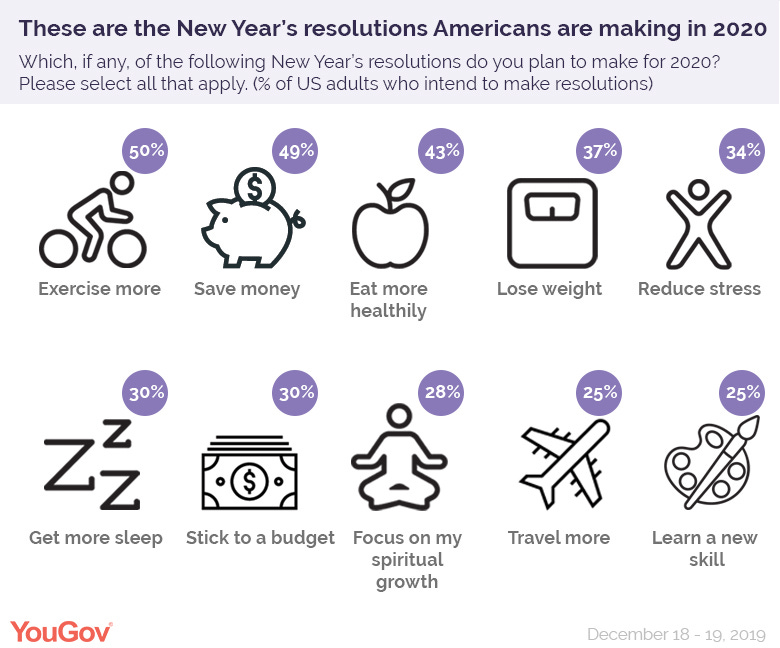This is the Sunday edition of Culture Study — the newsletter from Anne Helen Petersen, which you can read about here. If you like it and want more like it in your inbox, consider subscribing.
Americans love New Year’s resolutions because we are perpetual strivers obsessed with self-improvement. The tradition of a New Year’s celebration, paired with the desire to clear one’s debts, dates back to both the Babylonians and, later, the Romans, who pegged it to the two-faced god Janus (god of dualities and transitions!) All of that makes sense, in a Wikipedia history sort of way, but I think the contemporary understanding of resolutions has a lot more to do with how the holiday, like all American holidays, has been overloaded with significance intended to simultaneously make us feel like we’re failing personally and that we can probably solve that failure by buying a thing or, even better, some array of things.
Back in 2013, the most popular New Year’s resolutions were to lose weight, exercise more, quit smoking, eat healthier, with a little bit of “be a better person” and “save money” thrown in. According to a YouGov poll, in 2020, people wanted to do, well, everything:
I actually think this methodology is pretty weird, because the poll allows you to select as many resolutions as you’d like — and if you see this array before you, you’re like, yes, of course, I want to improve in all of these areas. But maybe that means it’s actually a better reflection of what Americans perceive as resolutions — aka personal failures.
Consider what each “resolution” suggests a person should be: exercising regularly, eating a very balanced and healthy diet, sleeping more/sufficiently, sticking to their budget and saving money, growing spiritually, traveling, and learning new skills. How!!!! Who can do this!?!? A retired person, maybe??
Working enough to have a healthy and balanced diet and cultivate new hobbies (which cost money!) makes it harder to exercise, but you still need to fit in those hobbies and some spiritual growth and travel (which also costs money!) which means that sleep levels go down, which makes it harder to lose weight, which makes it harder to keep your stress levels down because you’re trying to do all of these things at once and constantly feel like you’re failing. Do one of these things and you will almost immediately start failing at the others, which ensures the need for more resolutions in years to come. And forget about spending more time with your family, developing new friendships, engaging meaningfully with your community — all that’s secondary until you can get the personal under control, which you never will.
Companies understand this. Advertising understands this. They target you where you’re most vulnerable — I’m failing! — and put the solution right there in your Instagram feed. An app, a product, a book, a plan, a fix, available for purchase…or the temptation that will blast your resolution out the door, and start the guilt cycle all over again. Feel like you need more money to be better; make that money and feel like you’re failing in other ways; decide you need even more money; repeat. Feel bad about Donald Trump; obsess over skin care; skin care doesn’t fill ever-expanding abyss; repeat. Feel like you’re failing; seek solution; fail at solution or solution fails you; repeat.
This isn’t just New Year’s resolution time, of course. It’s all times, at least under capitalism, which depends on the cultivation of a constant feeling of lack, no matter how much abundance you have received or generated. There’s always more to be done, more ways to improve, productivity levels to cultivate. It’s resolutions all the way down! Significantly, this obsession with personal amelioration also distracts us from the sort of collective action that would actually change things, or work towards a society where “eat a healthy diet” and “save money” weren’t in direct opposition to one another.
This ideology of self-improvement-through-consumption intersects with the Protestant Christian ethics, whose most hackneyed form suggests that we are undeserving sinners, in constant need of reform — instead, you know, a perfect creation of God, absolutely deserving of God’s love, all of the other messages that infuse the gospel. It doesn’t matter if you’re not Christian. It doesn’t matter if you think capitalism is bullshit. If you live in the United States, or any country that’s adopted a similar ethos, you swim in it.
You can, of course, swim against the tide. That’s exhausting in a different way, and like everyone, sometimes I have more energy to do it than others. Sometimes I’m writing a piece like this. And sometimes I’m buying a pair of overpriced kiwi bird book ends after getting a Facebook ad for them at 8 pm on a Saturday night.
But on New Year’s Eve, I’ve tried to do the same practice for the last few years. Whoever I’m with, we ask ourselves: What was the best thing about the last year, and what are you looking forward to this year? It’s simple and maybe cheesy, but I find that it tilts me away from resolution and towards reflection. That doesn’t mean ignoring all of the shit and sadness of the past year. But for a moment, it feels important to acknowledge what has been enough, that I am enough, and that the changes I want to make in my life and the world won’t come by buying anything or by regimenting my body.
You, yourself — you’re pretty perfect. The world itself, functioning as it is now under capitalism, it’s not. It’s amazing how working to fix what’s actually broken could fix whatever you perceive as broken in yourself.
Things I Read and Loved This Week:
Something I needed to read this week
Who did J.K. Rowling become?
A remarkable, devastating, paradigm-shifting piece of journalism on how COVID Hollowed Out an Entire Generation of Black Men
The Haunting of Tulsa
The future of ski towns and the workers who make them possible
This week’s just trust me
Some things I wrote at the end of the year and forgot to link to here:
My piece on the future of office “flexibility” for the NYT Sunday Review
As always, if you know someone who’d enjoy this sort of thing in their inbox, please forward it their way. If you’re able, consider going to the paid version of the newsletter — one of the perks = weirdly fun/interesting/generative discussion threads, just for subscribers, every week, which are thus far still one of the good places on the internet.
If you are a contingent worker or un- or under-employed, just email and I’ll give you a free subscription, no questions asked. If you’d like to underwrite one of those subscriptions, you can donate one here.
You can find a shareable version online here. You can follow me on Twitter here, even though I’m currently avoiding it, and Instagram here. Feel free to comment below — and you can always reach me at annehelenpetersen@gmail.com.







"You can, of course, swim against the tide. That’s exhausting in a different way, and like everyone, sometimes I have more energy to do it than others. Sometimes I’m writing a piece like this. And sometimes I’m buying a pair of overpriced kiwi bird book ends after getting a Facebook ad for them at 8 pm on a Saturday night."
I love this. So true.
Wow, so good. I think this essay for me qualifies as "things I already know, but bear repeating". That the machine is built to make us turn inward as opposed to towards each other and fix systemic problems together was exactly what I needed to hear. Thank you.